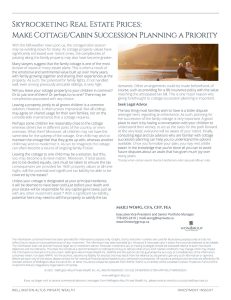Skyrocketing Real Estate Prices:
Make Cottage/Cabin Succession Planning a Priority
With the fall weather now upon us, the cottage/cabin season may be winding down for many. As cottage property values have significantly increased over recent times, the complexities of passing along the family property may also have become greater.
If you’d like to schedule an appointment with me or my team, please contact us at 778 655 2410 or use the chat feature or contact form in the footer below.
Many lawyers suggest that the family cottage is one of the most divisive of issues in many estate plans. This is often a result if the emotional and sentimental value built up over many years, with family growing together and sharing their experiences at the property. As such, the potential for family fights, if not handled well, even among previously amicable siblings, is very high.
Will you leave your cottage property to your children in common? Or to just one of them? Or perhaps to no one? There may be complexities associated with any choice.
Leaving a property jointly to all grown children is a common solution. However, if often proves impractical. Not all siblings may agree on shared usage for their own families, nor on the considerable maintenance that a cottage requires.
Perhaps some children live reasonably close to the cottage whereas others live in different parents of the country, or even overseas. What then? Moreover, all children may not have the same idea for the upkeep of the cottage. One child may wish to maintain the vintage feel that they grew up with, whereas another child may wish to modernize it. As can be imagined, the cottage can often become a source of ongoing family friction.
Leaving the cottage to one child may be a solution, but this, too, may become a divisive matter. Moreover, if the total assets are to be divided equally, care must be taken to ensure the tax consequences are provided for. With property values at all-time highs, will the potential and significant tax liability be able to be covered by the estate?
Unless your cottage is designed as your principal residence, it will be deemed to have been sold just before your death and your estate will be responsible for any capital gains taxes, just as with any other investment assets. With a significant tax liability, potential heirs may need to sell the property to satisfy the tax demands. Other arrangements could be made beforehand, of course, such as providing for a life insurance policy with the value matching the anticipated tax bill. This is one major reason why giving forethought to cottage succession planning is important.
Seek Legal Advice
The last thing most families with to have is a bitter dispute amongst heirs regarding an inheritance. As such, planning for the succession of the family cottage is very important. A good place to start is by having a conversation with your children to understand their wishes, to act as the basis for the path forward. At the very least, everyone will be aware of your intent. Finally, consulting legal and tax advisors who are familiar with cottage succession planning can help you to understand the options available. Once you formalize your plan, you may rest a little easier in the knowledge that you’ve done all you can to avoid future disputes about an asset that have given much joy over many years.
If you’d like to schedule an appointment with me or my team, please contact us at 778 655 2410 or use the chat feature or contact form in the footer below.
I look forward to connecting with you again soon.
Sincerely,
Maili Wong, CFA, CFP, FEA
Senior Portfolio Manager
Executive Vice-President
If you have any questions about how this relates to you or your investment portfolio and financial plan, please give us a call at 778 655 2410 or email us at thewonggroup@wprivate.ca






